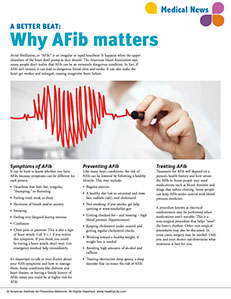SYMPTOM CHECKER
CONDITIONS
Male
Female
Child
Arm, Hand & Shoulder Concerns
Legs & Feet Concerns
Dental & Mouth Concerns
Ear & Nose
Eye Conditions
Head Conditions
Arm, Hand & Shoulder Concerns
Legs & Feet Concerns
Front
Back
Arm, Hand & Shoulder Concerns
Dental & Mouth Concerns
Ear & Nose
Eye Conditions
Head Conditions
Arm, Hand & Shoulder Concerns
Dental & Mouth Concerns
Ear & Nose
Eye Conditions
Head Conditions
Front
Back
Arm, Hand & Shoulder Concerns
Neck Links
Head & Neck Concerns
Arm, Hand & Shoulder Concerns
Neck Links
Head & Neck Concerns
Front
Back
Online Clinic
Wise Healthcare
Why AFib matters

Print on Demand
Atrial fibrillation, or “AFib,” is an irregular or rapid heartbeat. It happens when the upper chambers of the heart don’t pump as they should. The American Heart Association says many people don’t realize that AFib can be an extremely dangerous condition. In fact, if AFib isn’t treated, it can lead to dangerous blood clots and stroke. It can also make the heart get weaker and enlarged, causing congestive heart failure.
Symptoms of AFib
It can be hard to know whether you have AFib, because symptoms can be different for each person.
• Heartbeat that feels fast, irregular, “thumping,” or fluttering
• Feeling tired, weak or dizzy
• Shortness of breath and/or anxiety
• Sweating
• Feeling very fatigued during exercise
• Confusion
• Chest pain or pressure: This is also a sign of heart attack. Call 9-1-1 if you notice this symptom. If you think you could be having a heart attack, don’t wait. Get emergency medical help immediately.
It’s important to talk to your doctor about your AFib symptoms and how to manage them. Some conditions like diabetes and heart disease, or having a family history of AFib, mean you could be at higher risk for AFib.
Preventing AFib
Like many heart conditions, the risk of AFib can be lowered by following a healthy lifestyle. This may include:
• Regular exercise
• A healthy diet low in saturated and trans fats, sodium (salt), and cholesterol
• Not smoking: if you smoke, get help quitting at www.smokefree.gov
• Getting checked for – and treating – high blood pressure (hypertension)
• Keeping cholesterol under control and getting regular cholesterol checks
• Working toward a healthy weight, if weight loss is needed
• Avoiding high amounts of alcohol and caffeine
• Treating obstructive sleep apnea, a sleep disorder that increases the risk of AFib.
Treating AFib
Treatment for AFib will depend on a person’s health history and how severe the AFib is. Some people may need medications, such as blood thinners and drugs that reduce clotting. Some people can keep AFib under control with blood pressure medicine.
A procedure known as electrical cardioversion may be performed when medications aren’t suitable. This is a non-surgical procedure that helps “reset” the heart’s rhythm. Other non-surgical procedures may also be discussed. In some cases, surgery may be needed. Only you and your doctor can determine what treatment is best for you.
This website is not meant to substitute for expert medical advice or treatment. Follow your doctor’s or health care provider’s advice if it differs from what is given in this guide.
The American Institute for Preventive Medicine (AIPM) is not responsible for the availability or content of external sites, nor does AIPM endorse them. Also, it is the responsibility of the user to examine the copyright and licensing restrictions of external pages and to secure all necessary permission.
The content on this website is proprietary. You may not modify, copy, reproduce, republish, upload, post, transmit, or distribute, in any manner, the material on the website without the written permission of AIPM.
2021 © American Institute for Preventive Medicine - All Rights Reserved. Disclaimer | www.HealthyLife.com















































